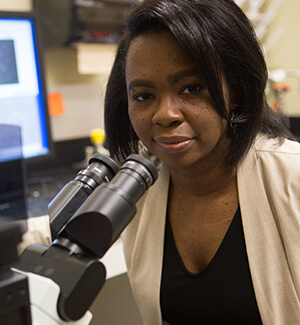Modeling Microbes and Molecular Communication Across Scales
Prof. Elebeoba E. May
Dept. of Medical Microbiology and Immunology
Wisconsin Institute of Discovery
University of Wisconsin-Madison

Abstract: Platforms that enable concurrent spatiotemporal and biochemical monitoring are generating multi-modal datasets for quantifying microbial dynamics and outcomes of molecular to cellular level communication. Using these data sets, we are developing in silico multicellular models to probe how bacteria respond to changing environments and use molecular communication networks to modulate community response. Multiscale methods such as agent-based models (ABM) are invaluable tools for capturing and predicting these microbe-microbe and microbe-environment interactions. We will discuss studies using Eschericia coli K12 to investigate state dependent population response and stress adaptation. The need for various mathematical modalities to describe molecular to cellular communication and interactions will also be highlighted.
Speaker’ Bio: As Director of the Multi-scale Immunobiology Design, Algorithms, and Simulation (MIDAS) Lab, Dr. May’s research focuses on the design of integrated quantitative and empirical platforms for the development of multi-scale, predictive models of biological systems. The emphasis of her work is on the development of engineering solutions to address challenges in the areas of chronic infection and disease, biodefense, and the growing field of biomanufacturing. Additional research thrust areas draw on coding theory, information and communication theory to model and investigate fundamental biological processes such as gene expression and microbial communication-enabled adaptation.
Dr. May is a recipient of an NIH/NHLBI K25 Quantitative Research Career Development Award, the NSF Directors Award for Superior Accomplishment, and Women of Color Research Sciences and Technology Award. Her research has been supported by grants from the DoE, DTRA, NIH, and NSF.